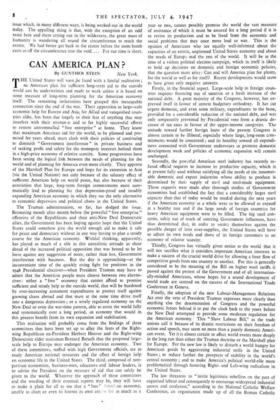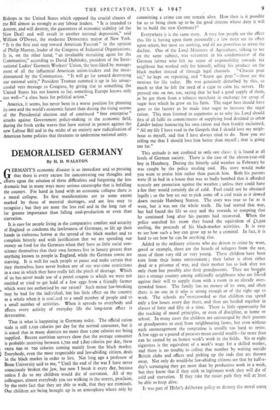CAN AMERICA PLAN ?
By GUNTHER STEIN New York.
THE United States will soon.be faced with a fateful realisation ; no American plan for sufficient long-term aid to the outside world can be underwritten and made to work unless it is based on some measure of long-term planning for the American economy itself. The remaining isolationists have grasped this inescapable connection since the end of the war. Their opposition to large-scale economic help for Europe and Asia, for Allied and vanquished coun- tries alike, has been due largely to their fear of anything that may interfere with their strenuo is and so far highly successful efforts to restore untrammelled " free enterprise " at home. They know that maximum American aid for the world, to be planned and pro- mised for years ahead, must clash with their policies of continuing to diminish " Government interference " in private business and of seeking profit and safety for the monopoly interests behind them in a high-price economy of relative scarcity. Some progressives have been seeing the logical link between the needs of planning for the world and of planning for America even more clearly. They approve of the Marshall Plan for Europe and hope for its extension to Asia (via the United Nations) not only because of the salutary effect of sufficient American help on world peace, but also because of their conviction that large, lone-term foreign commitments must auto- matically lead to planning for that depression-proof and steadily expanding American economy in which they see the only alternative to economic depression and political chaos in the United States.
The Truman administration, so far, has dodged the issue. Retreating month after month before the powerful " free enterprise " offensive of the Republicans and their anti-New Deal Democratic allies, the Government has been hoping against hope that the United States could somehow give the world enough aid to make it safe for peace and democracy without in any way having to plan a steady course for the American economy. Wishful thinking, apparently, has played as much of a role in this unrealistic attitude as sheer dread of the increased political opposition that was bound to be let loose against any suggestion of more, rather than less, Government interference with business. But the day- is approaching—at the inconvenient time of the quickly rising fight for positions in the 1948 presidential elections—when President Truman may have to admit that the American people must choose between two alterna- tives: either a " free" economy that cannot afford to promise sufficient and steady help to the outside world, that will be burdened by ever-increasing armament expenditures to protect itself against growing chaos abroad and that must at the same time drive itself into a dangerous depression ; or a wisely regulated economy on the New Deal or even the war-time pattern, able to assist the world fully and systematically over a long period, an economy that would in this process benefit from its own expansion and stabilisation.
This realisation will probably come from the findings of three committees that have been set up to allay the fears of the Right- wing Republican ex-President Herbert Hoover and the Right-wing Democratic elder statesman Bernard Baruch that the proposed large- scale help to Europe may endanger the American economy. Two of these committees, staffed with high Government officials, are to study American national resources and the effect of foreign help on economic life in the United States. The third, composed of non- partisan economists, business-men, educators and labour leaders, is to advise the President on the measure of aid that can safely be given to the world. Whatever the approach of these committees and the wording of their eventual reports may be, they will have to make it plain for all to see that a "free" American economy, unable to chart or even io foresee its own course for as much as a
year or two, cannot possibly promise the world the vast measure of assistance of which it must be assured for a long period if it is to revive its production and to be freed from the economic and social problems that may once more lead to war. This is the opinion of Americans who are equally well-informed about the capacities of an erratic, unplanned United States economy and about the needs of Europe and the rest of the world. It will be at the time of a violent political election campaign, which in itself is likely to hold up decisions on domestic and foreign economic policies, that the question must arise: Can and will America plan for plenty, for-the world as well as for itself? Recent developments would seem to have given only negative answers.
Firstly, in the financial aspect. Large-scale help to foreign coun- tries requires financing out of taxation or a fresh increase of the national debt. A great majority of the Congress, however, has ex- pressed itself in favour of utmost budgetary orthodoxy. It has cut urgent domestic, and even some military, expenditures to the bone, provided for a considerable reduction of the national debt, and was only temporarily prevented by Presidential veto from a drastic de- crease of tax rates in favour of the upper-income categories. The attitude toward further foreign loans of the present Congress is almost certain to be illiberal, especially where large, long-term com- mitments would be concerned ; and its hostility toward all expendi- tures connected with Government endeavours to promote domestic development work and policies of economic expansion will remain unchanged.
Secondly, the powerful American steel industry has recently re- fused official requests to increase its productive capacity, which is at present fully used without satisfying all the needs of the innumer- able domestic and export industries whose ability to produce is determined by their supply of steel and steel-made equipment. Those requests were made after thorough studies of Government economists had established the fact that a considerably larger steel capacity than that of today would be needed during the next years if the American economy as a whole were to be allowed to expand at a healthy rate and if the large needs of foreign countries for heavy American equipment were to be filled. The big steel con- cerns, safely out of reach of coercing Government influences, have thus determined that, in order to secure themselves against the possible danger of later over-supplies, the United States will have to adjust its own needs and those of its foreign customers to an economy of relative scarcity.
Thirdly, Congress has virtually given notice to the world that it will not sacrifice what it considers important American interests to make a success of the crucial world drive for allowing a freer flow of competitive goods from one country to another. For this is generally considered to be the meaning of the Bill on higher wool tariffs it passed against the protest of the Government and of all internation- ally-minded Americans, whose hopes for a sound development of world trade are centred on the success of the International Trade Conference in Geneva.
Finally, the adoption of the new Labour-Management Relations Act over the veto of President Truman expresses more clearly than anything else the determination of Congress and the powerful economic forces behind it to put the clock back to the years before the New Deal attempted to provide some moderate regulation for the American economy. This " Slave Labour Bill," as the trade unions call it because of its drastic restrictions on their freedom of action and speech, may seem no more than a purely domestic Ameri- can event. Yet it is almost certain to affect world events more deeply in the long run than either the Truman doctrine or the Marshall plan for Europe. For the new law is likely to disturb a world hungry for American goods by aggravating industrial strife in the United States ; to reduce further the prospects of stability in the world's central economy ; and to make America's political world-role more problematical through fostering Right- and Left-wing radicalism in the United States.
The law threatens to " invite legitimate rebellion on the part of organised labour and consequently to encourage widespread industrial unrest and confusion," according to the National Catholic Welfare Conference, an organisation made up of all the Roman Catholic Bishops in the United States which opposed the crucial clauses of the Bill almost as strongly as any labour leaders. " It is intended to destroy, and will destroy, the guarantees of economic stability (of the New Deal) and will result in another national depression," said William O'Dwyer, the moderate Democratic mayor of New York. " It is the first real step toward American Fascism" in the opinion of Philip Murray, leader of the Congress of Industrial Organisations. It is, on the other hand, " an invaluable recruiting agent for the Communists," according to David Dubinsky, president of the Inter- national Ladies' Garment Workers' Union, the best-liked by manage- ment of all the influential American union-leaders and the most- denounced by the Communists. " It will go far toward destroying our national unity," President Truman summed it up in his unsuc- cessful veto message to Congress, by giving rise to something the United States has not known so far, something Europe knows only too well—" a class basis for political action."
America, it seems, has never been in a worse position for planning its own and the world's economic future than during the rising storms of the Presidential election and of continued " free enterprise " attacks against Government policy-making in the economic field, during the fresh strike waves that have started in protest against the new Labour Bill and in the midst of an entirely new radicalisation of American home policies that threatens to undermine national unity.







































 Previous page
Previous page